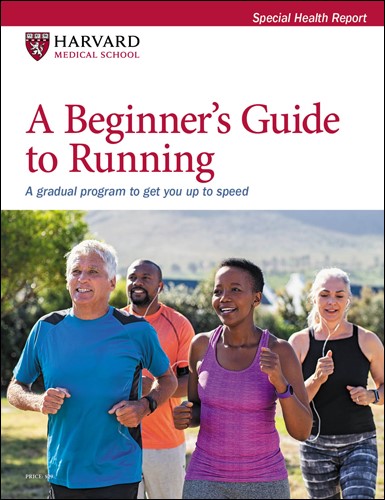Harvard Health Blog
Running for health: Even a little bit is good, but a little more is probably better

Marathoners are the thoroughbreds of high-performance runners, but even the draft horses of the running world — slow and steady joggers — improve their health. A study out this week in the Journal of the American College of Cardiology finds that even five to 10 minutes a day of low-intensity running is enough to extend life by several years, compared with not running at all. It shows that the minimal healthy "dose" of exercise is smaller than many people might assume.
But if your favorite activity is a brisk walk in the park or a quick game of tennis, the research has implications for you, too. "There is no question that if you are not exercising and if you make the decision to start — whether it's walking, jogging, cycling, or an elliptical machine — you are going to be better off," says cardiologist Dr. Aaron Baggish, the associate director of the Cardiovascular Performance Program at Harvard-affiliated Massachusetts General Hospital and an accomplished runner himself
Take five to stay alive
The new study focused on a group of more than 55,000 men and women ages 18 to 100. About a quarter of them were runners. Over 15 years, those who ran just 50 minutes a week or fewer at a moderate pace were less likely to die from either cardiovascular disease or any cause, compared with those who didn't run at all.
The study suggests a relatively low entry level for the benefit of jogging, but it is not a prescription. "A little bit is good but a little bit more is probably better," Dr. Baggish says. A 2013 study in Denmark suggested that the "sweet spot" for maximum longevity is up to 2.5 hours of running a week.
Although running can trim away some of your existing risk of cardiovascular disease, it doesn't entirely eliminate it. The combined effect of lifestyle, diet, and family history still contribute to your lifetime risk.
"There is no question that the fitter you are and the more exercise you do, the longer you live and the better your quality of life," Dr. Baggish says. "But it doesn't confer immunity."
Feeling better
This study used preventing death to measure the benefit of running, but it's not the most typical reason for running. "Many dedicated long-term runners do not run because they want to live longer," Dr. Baggish notes. "They run because it makes them feel better on a daily basis. There is a mood elevating, quality-of-life benefit that comes from being a regular exerciser."
For regular runners, the cost of feeling good can be strains and sprains, so Dr. Baggish advocates for the value of what he calls "active rest." His rule of thumb, not supported by any specific research, is that it's a good idea to spend 25% of exercise time over the course of a year running at a lower level of intensity or doing other activities like swimming or biking.
"The body responds to training, but to preserve that benefit over the long haul there needs to be active periods of recovery," Dr. Baggish says. "Pulling back allows the body to repair and heal."
Disclaimer:
As a service to our readers, Harvard Health Publishing provides access to our library of archived content. Please note the date of last review or update on all articles.
No content on this site, regardless of date, should ever be used as a substitute for direct medical advice from your doctor or other qualified clinician.













